
CREDIT: TEKTRONIX
Tektronix business unit EA Elektro-Automatik (EA), a global leader in DC programmable power supplies and bidirectional power supplies, announced an enhanced EA BTS 10300 Battery Test System.
The EA BTS 10300 offers 300kW of power in a single 42U-high rack and occupies only 6.5ft2 of production-floor space. This compact, automated battery cycler and test system is a direct response to the pressing challenges faced by manufacturers in testing electric vehicle (EV) batteries efficiently and effectively. Specifically designed to meet the rapidly evolving demands for higher power battery technologies in the EV industry and beyond, the enhanced BTS 10300 Battery Test System is ushering in a new era in battery testing technology.
"The EA BTS 10300 Battery Test System represents a leap in testing technology, offering significant cost and space savings while being environmentally friendly,” shares Russ Gaubatz, EA Elektro-Automatik senior applications engineer. “Its power regeneration and efficient operation cut electrical and HVAC costs, and its compact design requires only a third of the floor space compared to competitors. With high voltage capabilities and autoranging, it's a future-proof investment that pays for itself by adapting to evolving testing needs.”
"EA Elektro-Automatik's EA BTS 10300 complements Tektronix's portfolio by adding advanced battery testing capabilities, crucial for the evolving needs of the EV market,” says James Hitchcock, general manager at Tektronix. “EA’s focus on innovation and efficiency matches the Tektronix commitment to delivering high-quality, reliable testing solutions. Together, we're enhancing our offerings to meet our customer’s testing and power conversion needs.”
This compact EV battery test rack provides substantial power in minimal space, a crucial benefit for the production EV battery test market. Its ability to parallel racks for 3.84 MW of testing capability underscores its scalability and efficiency.
With 2000 VDC capacity for high-voltage EV battery tests, the EA BTS 10300 can supply and sink up to 2,400 A per rack, reaching a total capacity of up to 30,720 A. The BTS 10300 high-current capability is essential for rigorous battery module tests and battery cell tests, including pulse testing which demands exponentially higher currents. Previously, achieving such performance required a costly, custom-built system. Now, the 10300 Series delivers this high-level functionality as a complete COTS turnkey solution, encompassing battery cycling, drive cycle simulations, insulation resistance tests, and more.
Featuring EA Elektro-Automatik's bidirectional power supply with SiC-based switching, the EA BTS 10300 offers efficient and rapid operation. This system not only reduces electrical costs by regenerating power back to the grid with up to 96.5% efficiency but also minimizes HVAC expenses due to its low heat generation. With system slew rates at least twice as fast as competitors and fast data acquisition rates of up to 1.5 kHz, it ensures precise and comprehensive EV battery testing.
The EA BTS 10300's true autoranging capability allows for a wide range of voltage and current adjustments without interrupting the test cycle. This feature is especially beneficial for adaptive testing requirements, making it a future-proof investment for evolving high-voltage EV battery test needs.
The launch of the enhanced EA BTS 10300 reflects both EA Elektro-Automatik and Tektronix’s commitment to innovation, customer feedback, and competitive superiority. Offering customizable HMI and data reporting, alongside the ability to adjust test ranges seamlessly, the EA BTS 10300 is well-suited for production EV battery tests. The system is currently available in the U.S. and Canada.